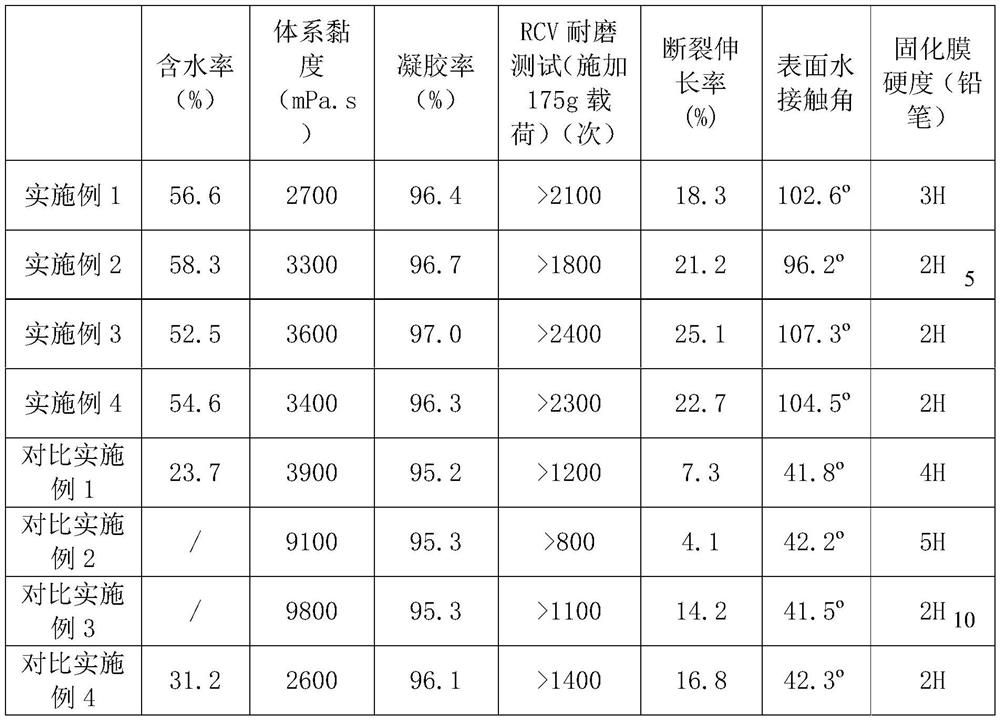A kind of low surface energy high water-soluble ultraviolet light curing water-based resin and preparation method thereof
A technology with high water solubility and low surface energy, applied in antifouling/underwater coatings, biocide-containing paints, coatings, etc., can solve the problem of reducing the cured film of epoxy acrylic resin, and achieve low friction coefficient, high Effect of cured gel ratio, abrasion resistance, and high water repellency
- Summary
- Abstract
- Description
- Claims
- Application Information
AI Technical Summary
Problems solved by technology
Method used
Image
Examples
Embodiment 1
[0035] In the first step, add 260g of bisphenol A epoxy (epoxy E51) into a 500mL three-necked flask, heat the oil bath to 110°C, stir, and add acrylic acid (the molar ratio of epoxy group to acrylic acid is 1:1) Add total mass 0.5% catalyst tetrakis (acetylacetonate) zirconium complex and 0.3% p-hydroxyanisole, add dropwise in the epoxy resin, the system acid value is less than 3mgKOH / g after reacting 4h, namely the epoxy acrylate I; In the second step, add 2mol of toluene diisocyanate (TDI) in a three-necked flask, heat to 60°C, dibutyltin dilaurate is added to 1mol of polyethylene glycol (molecular weight 400) by 0.2% of the total mass, drop Add to toluene diisocyanate (TDI) solution, continue to react for 3 hours after dripping, add 0.2% p-hydroxyanisole to 1mol of hydroxyethyl acrylate, add the above reaction system, raise the temperature to 100°C and react for 2.5 hours to obtain There is also polyurethane acrylic acid II with -NCO group at one end; the third step is to a...
Embodiment 2
[0038] In the first step, add 210g novolac epoxy resin to a 500mL three-necked flask, heat the oil bath to 115°C, stir, and add 0.8% of the total mass to the measured acrylic acid (the molar ratio of epoxy group to acrylic acid is 1:1). The catalyst triethanolamine and 0.8% p-hydroxyanisole are added dropwise into the epoxy resin, and the acid value of the system after 3 hours of reaction is less than 3mgKOH / g, that is, epoxy acrylate I; in the second step, add 2mol of isophorone diisocyanate (IPDI), heated to 80 ° C, dibutyltin dilaurate is added to 1mol of polyether diol by 0.6% of the total mass, and isophorone diisocyanate (IPDI) is added dropwise ) solution, continue to react for 2 hours after dripping, add 0.8% p-hydroxyanisole to 1mol of hydroxypropyl methacrylate, add the above reaction system, raise the temperature to 107°C for 3 hours, and obtain -NCO at one end The urethane acrylate II of the group; the third step, add a certain amount of epoxy acrylate I in the thr...
Embodiment 3
[0041] In the first step, add 420g of bisphenol A epoxy (epoxy E44) into a 1000mL three-necked flask, heat the oil bath to 100°C, stir, and add acrylic acid (the molar ratio of epoxy group to acrylic acid is 1:1) Add total mass 0.6% catalyst tetrabutylammonium bromide and 0.3% p-hydroxyanisole, add dropwise in the epoxy resin, after reacting for 3.5h, the acid value of the system is less than 3mgKOH / g, that is, the epoxy acrylate I; In the second step, add 2mol of diphenylmethane diisocyanate (MDI) in a three-necked flask, heat to 70°C, and dibutyltin dilaurate is added to 1mol of polyethylene glycol (molecular weight 600% by 0.4% of the total mass) ), added dropwise in the diphenylmethane diisocyanate (MDI) solution, continued to react for 2h after the drop, added 0.3% p-hydroxyanisole in 1mol of hydroxyethyl methacrylate, added the above reaction system, and heated up to React at 95°C for 2.5h to obtain urethane acrylate II with —NCO group at one end; in the third step, add ...
PUM
| Property | Measurement | Unit |
|---|---|---|
| acid value | aaaaa | aaaaa |
| viscosity | aaaaa | aaaaa |
| contact angle | aaaaa | aaaaa |
Abstract
Description
Claims
Application Information
 Login to View More
Login to View More - R&D Engineer
- R&D Manager
- IP Professional
- Industry Leading Data Capabilities
- Powerful AI technology
- Patent DNA Extraction
Browse by: Latest US Patents, China's latest patents, Technical Efficacy Thesaurus, Application Domain, Technology Topic, Popular Technical Reports.
© 2024 PatSnap. All rights reserved.Legal|Privacy policy|Modern Slavery Act Transparency Statement|Sitemap|About US| Contact US: help@patsnap.com








